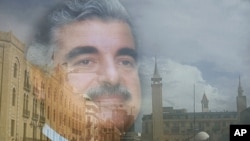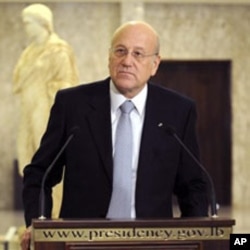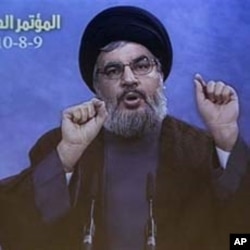Lebanon’s new Prime Minister, Najib Mikati, is facing his toughest test yet in office. In a matter of weeks, Lebanon is obligated to pay its share of the budget for the Special Tribunal for Lebanon (STL), the international legal body tasked with prosecuting suspects implicated in the assassination of former Prime Minister Rafik Hariri and 21 others in a powerful truck bomb attack on Beirut’s waterfront in February, 2005. The STL this year indicted four men - all of whom are members of the Shiite militant group Hezbollah. While Mikati supports funding the STL, the majority of his cabinet does not.
Mikati, a self-made Sunni billionaire from northern Lebanon, was nominated for the premiership with explicit backing from Hezbollah and its March 8 Alliance in January, following the collapse of Lebanon's government in late 2009. Aside from being the dominant armed group in Lebanon, Hezbollah is also the country’s strongest political force.
The March 8 Alliance holds a majority in Mikati’s 30-member cabinet and, in theory, could bring it down over an issue such as funding the STL. The group sees the STL as little more than a tool of Israel and the United States.
Untouchables
The 2011 budget for the STL is $65.7 million, of which Lebanon is responsible for 49 percent according the rules set out by the tribunal. The remainder of the budget is paid for by volunteer member states. To date, 25 countries have contributed to the tribunal, but the only Middle Eastern country having done so is Kuwait.
U.N. Secretary General Ban Ki-moon recently sent a letter to Mikati informing him that Lebanon’s portion of the STL’s 2011 budget was coming due. According to STL spokesman Marten Youssef, “Thirty days after receipt of that letter, the Lebanese government is supposed to pay. They haven’t. And so that’s where we’re at right now.”
There is little that the STL can do if Lebanon ultimately decides not to pay its share of the 2011 budget. Lebanon can, however, be referred to the United Nations Security Council. In theory, the Security Council can invoke Chapter 7 of the United Nations charter, which stipulates that the body should “decide what measures shall be taken in accordance with Articles 41 and 42, to maintain or restore international peace and security,” including sanctions or military force. However, this outcome is highly unlikely.
Four members of Hezbollah were indicted earlier this year on charges of committing a terrorist act, conspiracy and other crimes related to the attack on Hariri’s convoy. The accused - Salim Ayyash, Mustafa Badreddine, Hassan Aneissy and Assad Sabra - have not appeared in public since then. Ayyash, believed to the main planner of the attack, is a dual U.S.-Lebanese citizen. Badreddine is the brother-in-law of Hezbollah’s most celebrated martyr, Imad Mughniyeh - an infamous figure who was widely believed to have planned the bombing of the U.S. Marine Corps barracks in Beirut in 1983, along with a host of other high-profile international terrorist attacks.
After the indictment against the four men was unsealed last July, Hezbollah Secretary General Hassan Nasrallah said in televised remarks that the accused would not be handed over to the tribunal “even in 300 years.” And with that in mind, the STL is eyeing other options.
“One of the unique features of the tribunal is that we can try the accused in their absence. This is a common procedure in Lebanese criminal law. But in order for us to move into in absentia proceedings, the trial chamber judges have to be convinced that enough efforts have been made [to apprehend the accused] and that efforts laid out in the tribunals rules have been exhausted,” says STL spokesman Marten Youssef. He adds, “Once both sides make their oral arguments, then we will determine whether or not to move into in absentia proceedings.”
Oral arguments by the prosecution and defense are due to begin on November 11 in the Netherlands - where the tribunal is headquartered for security reasons - in a development that Youssef calls “a significant milestone.”
It appears almost certain that the trial will proceed in absentia. Few Lebanese expect the Internal Security Forces to even attempt to apprehend the four suspects and hand them over to the STL.
More than money
The STL is a controversial topic in Lebanon, even among some of its supporters.
Formed in 2005, the STL's first prosecutor was a German, Detlev Mehlis. Later that same year he issued the Mehlis Report, which implicated "Syrian security officials" and their allies in the Lebanese security forces in the Hariri assassination. Several Lebanese generals were imprisoned for a number of years and later released. The following year, Mehlis left the STL and was replaced for two years by Belgian Serge Brammertz, who was followed by Canadian Daniel Bellemare - the current chief prosecutor of the STL.
In a televised interview with Hezbollah’s Al Manar television this week, Nasrallah appeared confident and showed little urgency regarding the deadline for funding the STL, saying, “The issue of the tribunal’s funding can be decided in the Cabinet when the time is appropriate.” Nasrallah added that Hezbollah still does not support funding the STL and, in a reference to Mikati, the billionaire, said "anyone who wants to finance the tribunal, let him do it from his own pocket.”
But regardless of the rhetoric, the deadlines, and the veiled threats between political rivals, Mikati's government doesn't seem to be in imminent danger of collapse. At least not yet.
“I think at this point, no one has any interest in bringing the Mikati government down - either internally or externally," says Lebanese political analyst Kamel Wazne. "As far as Western powers, they are very concerned about the stability of Lebanon, and I think keeping this government intact is in the best interest of keeping Lebanon stabilized."
With neighboring Syria on the cusp of armed revolt, keeping Lebanon stable has for many players become even more of a priority. Although none of his dwindling options are ideal, Mikati does have some.
“I think he’ll go to the end,” Wazne says, suggesting that Mikati will weather the current political storm. “He has an election in less than two years, and has to satisfy his constituents. He can say, ‘I tried. I’m the prime minister, but I don’t have the power to persuade everyone in the government. I did my share, but this does not mean that the issue of funding [the STL] has to destroy the country.’”






